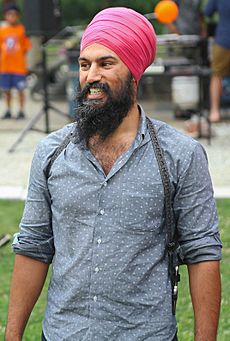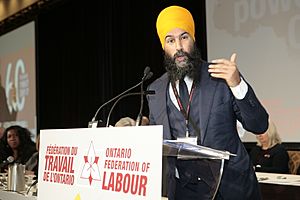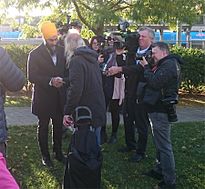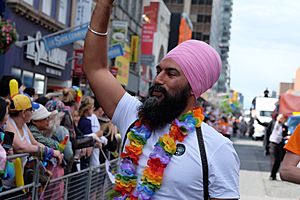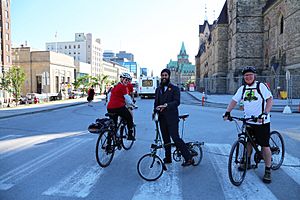Jagmeet Singh facts for kids
Quick facts for kids
Jagmeet Singh
|
|
|---|---|
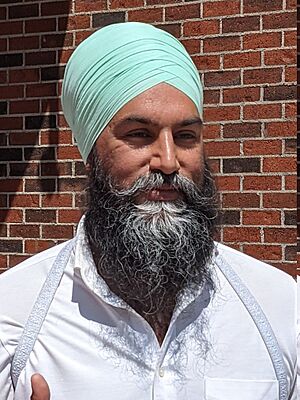
Singh in 2022
|
|
| Leader of the New Democratic Party | |
| In office October 1, 2017 – May 5, 2025 |
|
| Deputy |
|
| Preceded by | Tom Mulcair |
| Succeeded by | Don Davies (interim) |
| Member of Parliament for Burnaby South |
|
| In office February 25, 2019 – April 28, 2025 |
|
| Preceded by | Kennedy Stewart |
| Succeeded by | Riding abolished; Wade Chang (Burnaby Central) |
| Member of the Ontario Provincial Parliament for Bramalea—Gore—Malton |
|
| In office October 6, 2011 – October 20, 2017 |
|
| Preceded by | Kuldip Kular |
| Succeeded by | Riding abolished |
| Personal details | |
| Born |
Jagmeet Singh Jimmy Dhaliwal
January 2, 1979 Scarborough, Ontario, Canada |
| Political party | New Democratic |
| Other political affiliations |
Ontario New Democratic |
| Spouse |
Gurkiran Kaur Sidhu
(m. 2018) |
| Children | 2 |
| Relatives | Gurratan Singh (brother) |
| Education | |
| Signature |  |
Jagmeet Singh (born January 2, 1979) is a Canadian politician. He was the leader of the New Democratic Party (NDP) from 2017 to 2025. He also served as a Member of Parliament (MP) for Burnaby South from 2019 to 2025. Before that, he was elected to the Legislative Assembly of Ontario in 2011. He represented the area of Bramalea—Gore—Malton. Jagmeet Singh is a Sikh from a Punjabi family. He was the first non-White person to lead a major federal political party in Canada.
After finishing law school, Singh became a lawyer. He started a law firm with his brother, Gurratan Singh. In 2011, he began his political career. He ran in the federal election for Bramalea—Gore—Malton but lost by a small number of votes. Later that year, he became a member of the provincial parliament (MPP) for the same area. In 2015, he became the deputy leader of the Ontario New Democratic Party. He served in this role until 2017. Singh decided to run for the leadership of the federal New Democratic Party in 2017. He won the election on October 1, 2017, with more than half of the votes.
When he was elected leader, Singh became the first person from a visible minority group to lead a major Canadian federal political party permanently. He was also the first turban-wearing Sikh to be a provincial politician in Ontario. Many in Canadian media have noticed his unique fashion style. Singh believes in progressive and social democrat ideas. He supports helping middle class families more. He also believes in taxing very rich people and large companies. In the 2019 federal election, the NDP lost 15 seats. They went from being the third-largest party to the fourth. In the 2021 federal election, the NDP gained one seat but remained the fourth party. In 2022, his party made an agreement with the Liberal Party. This agreement helped create the Canadian Dental Care Plan and a plan for national pharmacare. In 2024, the NDP ended this agreement.
In the 2025 federal election, Singh led the NDP to its lowest result ever. The party lost its official party status. Singh himself was defeated in the area of Burnaby Central. On election night, he announced he would step down as party leader. Don Davies became the interim leader until a new one is chosen.
Contents
Early Life and Education
Jagmeet Singh was born on January 2, 1979, in Scarborough, Ontario. This city is now part of Toronto. His parents were immigrants from Punjab, India. His mother was from Ghudani Khurd and his father from Thikriwala. Singh belongs to the Dhaliwal clan of Jat Sikhs.
Singh's great-grandfather, Sewa Singh Thikriwala, was a political activist. He worked for India's independence. Another great-grandfather, Hira Singh, served in World War I and World War II in the Sikh Regiment. After living in India for a year as a baby, Singh spent his early childhood in St. John's and Grand Falls-Windsor. His family then moved to Windsor, Ontario.
From grades 6 to 12, Singh attended Detroit Country Day School in Michigan. He earned a science degree in biology from the University of Western Ontario in 2001. In 2005, he graduated with a law degree from York University's Osgoode Hall Law School. He became a lawyer in Ontario in 2006.
Singh has two younger siblings, a brother named Gurratan Singh and a sister named Manjot. Gurratan Singh was elected to the Ontario provincial government in 2018. He represented the area of Brampton East.
Early Career and Entering Politics
Before becoming a politician, Singh worked as a lawyer. He defended people accused of crimes in the Greater Toronto Area. He first worked at a law firm called Pinkofskys. Later, he started his own law practice, Singh Law, with his brother Gurratan. Singh said that his work as a lawyer, especially protecting people's rights, made him want to enter politics.
Singh also helped an activist group for free. This group protested a visit to Canada by Kamal Nath, a former Indian trade minister. When their concerns were not heard, Singh was inspired to run for office. He wanted to make sure such concerns were represented.
Singh began his political career by running in the 2011 Canadian federal election. He was the NDP candidate for the area of Bramalea—Gore—Malton. During the election, Singh stopped using his family name, Dhaliwal. He wanted to show he rejected the caste system, which can create inequality. Instead, he used the more common name Singh. He lost the election by a small number of votes.
Provincial Politics in Ontario
First Term (2011–2014)
Becoming a Provincial Politician
In the 2011 Ontario general election, Singh ran as the NDP candidate for the provincial area of Bramalea—Gore—Malton. He won, defeating the Liberal politician Kuldip Kular. Singh became the first New Democrat elected in the Peel Region. He was also the first turban-wearing Member of Provincial Parliament (MPP). In the provincial government, Singh became the NDP's critic for the attorney general and consumer services. He also served as his party's deputy house leader.
Key Actions and Bills
Singh pushed for more accountability from the police. He wanted the government to make laws to strengthen Ontario's Special Investigations Unit (SIU). This unit investigates serious incidents involving police. He criticized the attorney general in 2011 after a report found that the province had weakened the SIU.
In March 2012, Singh introduced a bill to change car insurance rules. This bill aimed to stop insurance companies from setting rates based on where people lived. However, the bill did not pass. In May 2012, he introduced another bill to address high fees on money transfers sent overseas. This bill also did not pass.
In March 2013, Singh proposed a motion asking the Liberal government to lower car insurance costs by 15 percent. The legislature passed his motion. This 15 percent reduction was included in the government's 2013 budget. In December 2013, a law introduced by Singh was passed. It recognized April as Sikh Heritage Month in Ontario.
Second Term (2014–2017)
Re-election and Continued Work
Singh won his area again in the 2014 Ontario general election. He received 43.6 percent of the votes. In November 2014, Singh voted against a government law about car insurance. He argued that it removed important protections for drivers.
In November 2015, Singh introduced a bill about Tarion. Tarion is a group that regulates home building in Ontario. Singh's bill would have allowed the Ontario Ombudsman to investigate Tarion. It would also have made Tarion more open about its work.
In October 2015, Singh proposed a motion to stop police from doing random street checks, also known as carding. On October 22, 2015, the legislature unanimously passed Singh's motion.
Singh also caused some discussion when he introduced a bill to allow turban-wearing Sikhs to ride motorcycles without helmets. The motion was not approved. Singh criticized the government for not supporting this right for the Sikh community.
Singh was also critical of how the province managed the Ornge Air Ambulance service. He called for more oversight of the agency. In June 2015, Singh was criticized for using government resources for political purposes. However, he was not fined because he fixed the issues quickly.
On October 20, 2017, after winning the federal NDP leadership race, Singh resigned as a provincial politician.
Leader of the New Democratic Party (2017–2025)
Becoming Party Leader
After the previous NDP leader, Tom Mulcair, lost a confidence vote, Singh was seen as a possible new leader. He announced he would run for the leadership of the New Democratic Party of Canada on May 15, 2017.
In August, Singh said his campaign had helped 47,000 people sign up for the party. Some rival campaigns questioned this number. A poll in September showed Singh leading the race for the first time. Days before the leadership vote, a video of Singh calmly dealing with a heckler went viral. This helped him gain support.
The leadership election happened on October 1, 2017. Singh won on the first vote with 53.8 percent of the votes. He then named Guy Caron, another leadership candidate, as the NDP's parliamentary leader.
Leading from Outside Parliament (2017–2019)
Singh chose to lead the NDP from outside of Parliament at first. He wanted to run in an area where he felt a "genuine connection." He said he would likely run in Brampton East in the 2019 election.
In December 2017, Singh said he would consider working with the Conservative Party to defeat a Liberal government if the NDP held the balance of power.
In February 2018, Singh suspended Saskatchewan MP Erin Weir from the NDP group in Parliament. This was due to complaints about Weir's behavior. Weir was later formally removed from the group.
Burnaby South By-election
On August 8, 2018, Singh announced he would run in a special election for Burnaby South. This seat became open when Kennedy Stewart resigned to run for mayor of Vancouver. Singh moved to Burnaby for the election. He won on February 25, 2019, with 38.9 percent of the votes.
2019 Federal Election
On October 21, 2019, Singh was re-elected in Burnaby South. The NDP won 24 seats across Canada. This was fewer than the 44 seats they won in 2015. However, the Liberal government did not win enough seats for a majority. This meant the NDP could influence decisions in Parliament. It was the lowest number of seats for the NDP since 2004. The Bloc Québécois became the third-largest party, passing the NDP. The NDP lost almost all its seats in Quebec. Some suggested that Singh's Sikh faith might have been a factor for voters in Quebec due to the Quebec law on religious symbols.
43rd Canadian Parliament
On June 17, 2020, Singh was removed from the House of Commons for the rest of the day.
2021 Federal Election
In August 2021, Singh announced a plan for mandatory COVID-19 vaccination for employees under union contracts. He promised that "All collective agreements include a process for progressive discipline − up to and including termination." He also promised $1 billion for vaccination programs and a national vaccine passport system. He gained support from other party leaders for these ideas.
44th Canadian Parliament
Singh was re-elected in Burnaby South with a strong majority. The 44th Canadian Parliament saw few changes from the previous one. The NDP's total number of seats remained almost the same at 25.
On March 22, 2022, the NDP made an agreement with the governing Liberal Party of Canada. This agreement focused on certain priorities. The government agreed to implement pharmacare by the end of 2023. A dental care program for low-income Canadians was also a priority to be enacted by 2025. This agreement was influenced by events like the Freedom Convoy and the 2022 Russian invasion of Ukraine. During the Gaza war, Singh called for an end to arms sales to Israel. He also called for the recognition of the State of Palestine. It was reported that an agent possibly connected to the Indian government had been tracking Singh. This led the Royal Canadian Mounted Police (RCMP) to place Singh and his family under police protection in late 2023.
The Conservative Party accused Singh of keeping the Liberal government in power to secure his parliamentary pension. He qualified for this pension in 2025, shortly before the federal election.
On September 4, 2024, Singh announced he was ending the 2022 agreement with the Liberals. He said he was unhappy with their progress on healthcare and affordability. Later that month, the NDP faced two competitive special elections. They won one in Winnipeg and greatly improved their vote share in another in Montreal.
2025 Federal Election
After the 2021 federal election, the NDP's support in polls stayed mostly the same. However, the party saw a brief rise in support to second place during the 2024–2025 Canadian political crisis. This happened after the Liberal party's support dropped. But after Justin Trudeau resigned and Mark Carney was elected as the new Liberal leader, the NDP's support fell again. Most of their support went to the Liberals. Singh defended his decision to support the Liberal government. He said he "could not stomach the idea" of a Conservative government. On election night, Singh was defeated in Burnaby Central. With the NDP losing its official party status, he announced he would step down as party leader.
Political Positions
When he launched his leadership campaign in 2017, Singh described himself as a progressive and a social democrat.
Economic Policy
Singh believes that "millions of Canadians are living in poverty." He supports a progressive tax system. This means people with higher incomes pay a larger percentage in taxes. He wants to remove some tax breaks for the highest earners. He would use that money to help low-income seniors, workers, and disabled Canadians. During his 2017 leadership campaign, Singh's tax plan included new tax brackets for the richest people. He also wanted to raise taxes on corporations.
Singh supports a $20/hour minimum wage. He also wants to tax online video services like Netflix. He strongly supports a universal pharmacare system. He says "universal healthcare is essential when we talk about equality for all Canadians." The NDP believes that closing tax loopholes for the very rich would pay for a universal pharmacare program.
In January 2019, Singh promised to encourage the building of 500,000 affordable homes. He would do this by removing federal taxes on new affordable housing projects.
Energy Policy
Singh wants to reduce Canada's carbon emissions to 30 percent of 2005 levels by 2025. He plans to help provinces stop using coal by 2030. He also wants to promote zero-emission vehicles. He supports making the tax system "greener" by giving money to companies that help the environment. He also wants to build a renewable energy "super grid." Singh has opposed the Trans Mountain Pipeline expansion project. This project has been criticized by former Alberta Premier Rachel Notley.
Foreign Policy
Singh has criticized Israel's actions during the Gaza war in Gaza. In May 2024, he posted a tweet after images of the Tel al-Sultan attack became widely seen. He said, "Images of the IDFs airstrike hitting a camp for displaced Palestinians in Rafah are horrifying. Images so terrible I won’t share them. The world is failing the people of Gaza. Canada is failing the people of Gaza."
Sikh Issues and Relations with India
In a 2011 interview, Singh said one reason he entered politics was to oppose comments made by Ujjal Dosanjh. Dosanjh, a Sikh politician, had said that Sikh extremism was growing in Canada.
Singh spent much of his early political career trying to get Ontario to recognize the 1984 anti-Sikh riots in India as an act of genocide. In 2016, he introduced a motion in the Ontario legislature for this. It failed, but a similar motion passed in 2017. In 2018, Singh asked the federal government to do the same.
In 2013, Singh was denied a visa to India because he raised the issue of the anti-Sikh riots. He was reportedly the first Western politician to be denied entry to India. In early 2018, the Indian government again denied him a visa. He had also appeared at events where others supported the Khalistan movement, which seeks an independent Sikh state.
In an October 2017 interview, Singh expressed doubts about the findings of an inquiry into the bombing of Air India Flight 182. The inquiry pointed to Talwinder Singh Parmar as the main terrorist. Singh was unwilling to criticize extremists who honored Parmar. However, in a later interview in March 2018, Singh changed his position.
Environmental Policy
On May 31, 2019, Singh promised that the NDP would build charging stations for electric vehicles. These would be at federal buildings and Canada Post locations. He also offered residents a $600 grant to help pay for home charging stations.
Singh initially supported the LNG Canada facility in Kitimat, British Columbia. This facility would be supplied by the Coastal GasLink Pipeline. However, it would affect native burial grounds and unceded lands like those of the Wetʼsuwetʼen. After the NDP lost a special election in Nanaimo to the Green Party in May 2019, Singh quickly changed his position. He began to oppose the LNG natural gas facility and fracking.
Quebec Policy
During a special election campaign in Quebec in October 2017, Singh said he supports Quebec's right of self-determination. He agrees with the NDP's 2005 Sherbrooke Declaration. This declaration states that Canada should recognize any independence vote won by Quebec separatists.
During the 2019 federal election, it was noted that Singh opposed Bill 21. This law bans religious symbols for some public workers.
Republicanism
Singh has argued that Canada should be a republic. He does not see the importance of the monarchy in the 21st century.
Social Issues
Singh has spoken about his own experience with racial profiling. He strongly supports a federal ban on carding. He calls this practice a form of systemic racism.
When asked about bringing back the long-gun registry, Singh said it was a difficult question. He also said it was important to understand regional differences in how things are viewed. Singh has urged Justin Trudeau and the Liberal Party to allow cities to ban handguns.
Personal Life
Singh practices Brazilian jiu-jitsu.
The World Sikh Organization of Canada recognized Singh in 2012. He was honored for being the first turbaned Sikh MPP in Ontario.
In a November 2017 TV show called Political Blind Date, Singh was paired with Doug Ford. Ford later became the Premier of Ontario. They explored different ways to travel. Singh took Ford on a bicycle ride in downtown Toronto. Ford drove Singh along a special streetcar path. Ford said they became friends, and Singh said Ford was "very warm and friendly." Jagmeet Singh enjoys cycling and owns six designer bicycles.
In January 2018, Singh became engaged to Gurkiran Kaur Sidhu. She is a fashion designer and co-founder of a Punjabi clothing line. He proposed to her at the vegetarian restaurant where they had their first date. Friends, family, and media members were there. They married on February 22, 2018. In August 2021, they announced they were expecting a child. Their daughter, Anhad, was born in January 2022. In July 2023, they announced they were expecting a second child, a daughter born in December 2023.
On April 26, 2025, Singh attended the Lapu-Lapu Day Block Party in Vancouver. This event celebrates Filipino heritage. He left minutes before a vehicle attack happened at the event. He said, "I just want the Filipino community to know that we stand with you."
Singh speaks English, French, and Punjabi fluently.
Electoral Record
Summary of Federal Elections
| Year | Party | Votes | Seats | Position | ||||
|---|---|---|---|---|---|---|---|---|
| Total | % | ±% | Total | ± | ||||
| 2019 | New Democratic | 2,903,722 | 15.98% | −3.78% |
|
−20 | Fourth party | |
| 2021 | 3,036,348 | 17.82% | +1.84% |
|
+1 | Fourth party | ||
| 2025 | 1,234,674 | 6.3% | −11.5% |
|
−18 | No status | ||
| Year | Type | Riding | Party | Votes for Singh | Result | Swing | |||||
|---|---|---|---|---|---|---|---|---|---|---|---|
| Total | % | P. | ±% | ||||||||
| 2011 | Federal general | Bramalea—Gore—Malton | New Democratic | 19,368 | 33.51% | 2nd | +21.49 | Lost | Gain | ||
| 2011 | Ontario general | Bramalea—Gore—Malton | Ontario New Democratic | 16,626 | 37.64% | 1st | +25.82 | Elected | Gain | ||
| 2014 | 23,519 | 44.32% | 1st | +6.68 | Elected | Hold | |||||
| 2019 | Federal by-election | Burnaby South | New Democratic | 8,848 | 38.90% | 1st | +3.83 | Elected | Hold | ||
| 2019 | Federal general | 16,956 | 37.67% | 1st | −1.42 | Elected | Hold | ||||
| 2021 | 16,382 | 40.34% | 1st | +2.67 | Elected | Hold | |||||
| 2025 | Burnaby Central | 9,353 | 18.16% | 3rd | −21.62 | Lost | Gain | ||||
Federal Elections
Burnaby Central
| Canadian federal election, 2025: Burnaby Central | ||||||||
|---|---|---|---|---|---|---|---|---|
| Party | Candidate | Votes | % | ±% | Expenditures | |||
| Liberal | Wade Chang | 21,745 | 42.23 | +10.98 | ||||
| Conservative | James Yan | 19,889 | 38.62 | +16.46 | ||||
| New Democratic | Jagmeet Singh | 9,353 | 18.16 | −21.62 | ||||
| PPC | Richard Farbridge | 506 | 0.98 | −2.40 | ||||
| Total valid votes/expense limit | 51,493 | 99.17 | ||||||
| Total rejected ballots | 430 | 0.83 | ||||||
| Turnout | 51,923 | 61.61 | ||||||
| Eligible voters | 84,278 | |||||||
| Liberal notional gain from New Democratic | Swing | +16.30 | ||||||
| Source: Elections Canada | ||||||||
| Note: number of eligible voters does not include voting day registrations. | ||||||||
Burnaby South
| Canadian federal election, 2021: Burnaby South | ||||||||
|---|---|---|---|---|---|---|---|---|
| Party | Candidate | Votes | % | ±% | Expenditures | |||
| New Democratic | Jagmeet Singh | 16,382 | 40.34 | +2.67 | $91,367.24 | |||
| Liberal | Brea Huang Sami | 12,361 | 30.44 | +6.65 | $97,095.22 | |||
| Conservative | Likky Lavji | 9,104 | 22.42 | –8.50 | $42,968.01 | |||
| PPC | Marcella Williams | 1,290 | 3.18 | +1.75 | $5,043.08 | |||
| Green | Maureen Curran | 1,185 | 2.89 | –2.61 | $839.33 | |||
| Independent | Martin Kendell | 296 | 0.73 | — | none listed | |||
| Total valid votes/expense limit | 40,608 | 99.29 | — | $110,662.02 | ||||
| Total rejected ballots | 291 | 0.71 | –0.22 | |||||
| Turnout | 40,899 | 51.15 | –5.74 | |||||
| Eligible voters | 79,964 | |||||||
| New Democratic hold | Swing | –1.99 | ||||||
| Source: Elections Canada | ||||||||
| Canadian federal election, 2019: Burnaby South | ||||||||
|---|---|---|---|---|---|---|---|---|
| Party | Candidate | Votes | % | ±% | Expenditures | |||
| New Democratic | Jagmeet Singh | 16,956 | 37.67 | –1.42 | $92,300.42 | |||
| Conservative | Jay Shin | 13,914 | 30.92 | +8.44 | none listed | |||
| Liberal | Neelam Brar | 10,706 | 23.79 | –2.23 | $102,915.79 | |||
| Green | Brennan Wauters | 2,477 | 5.50 | – | $901.27 | |||
| PPC | Al Rawdah | 645 | 1.43 | –9.22 | none listed | |||
| Libertarian | Rex Brocki | 243 | 0.54 | – | $0.00 | |||
| Marxist–Leninist | Brian Sproule | 62 | 0.14 | – | $0.00 | |||
| Total valid votes/expense limit | 45,006 | 99.07 | – | |||||
| Total rejected ballots | 417 | 0.93 | +0.10 | |||||
| Turnout | 45,423 | 56.89 | +25.88 | |||||
| Eligible voters | 79,849 | |||||||
| New Democratic hold | Swing | –4.93 | ||||||
| Source: Elections Canada | ||||||||
| Canadian federal by-election, February 25, 2019: Burnaby South Resignation of Kennedy Stewart |
||||||||
|---|---|---|---|---|---|---|---|---|
| Party | Candidate | Votes | % | ±% | ||||
| New Democratic | Jagmeet Singh | 8,848 | 38.90 | |||||
| Liberal | Richard T. Lee | 5,919 | 26.02 | |||||
| Conservative | Jay Shin | 5,147 | 22.63 | |||||
| PPC | Laura-Lynn Thompson | 2,422 | 10.65 | New | ||||
| Independent | Terry Grimwood | 242 | 1.06 | New | ||||
| Independent | Valentine Wu | 168 | 0.74 | New | ||||
| Total valid votes/expense limit | 22,746 | 99.17 | – | |||||
| Total rejected ballots | 190 | 0.83 | +0.23 | |||||
| Turnout | 22,936 | 30.10 | -30.68 | |||||
| Eligible voters | 76,204 | |||||||
| New Democratic hold | Swing | +5.84 | ||||||
| Source: Elections Canada | ||||||||
Bramalea—Gore—Malton
| Canadian federal election, 2011: Bramalea—Gore—Malton | ||||||||
|---|---|---|---|---|---|---|---|---|
| Party | Candidate | Votes | % | ±% | Expenditures | |||
| Conservative | Bal Gosal | 19,907 | 34.44 | −2.68 | – | |||
| New Democratic | Jagmeet Singh | 19,368 | 33.51 | +24.49 | – | |||
| Liberal | Gurbax Singh Malhi | 16,402 | 29.40 | −15.65 | – | |||
| Green | John Moulton | 1,748 | 3.02 | −2.14 | – | |||
| Marxist–Leninist | Frank Chilelli | 371 | 0.64 | +0.02 | ||||
| Total valid votes | 57,796 | 100.00 | – | |||||
| Total rejected ballots | 454 | 0.80 | +0.18 | |||||
| Turnout | 58,250 | 54.75 | +5.01 | – | ||||
| Eligible voters | 106,395 | – | – | |||||
Provincial Elections
| Ontario general election, 2014: Bramalea—Gore—Malton | ||||||||
|---|---|---|---|---|---|---|---|---|
| Party | Candidate | Votes | % | ±% | ||||
| New Democratic | Jagmeet Singh | 23,519 | 44.32 | +6.68 | ||||
| Liberal | Kuldip Kular | 17,873 | 33.68 | +0.75 | ||||
| Progressive Conservative | Harjit Jaswal | 9,403 | 17.72 | −4.99 | ||||
| Green | Pauline Thornham | 2,277 | 4.29 | +1.79 | ||||
| Total valid votes | 53,072 | 100.0 | ||||||
| New Democratic hold | Swing | +2.96 | ||||||
| Source: Elections Ontario | ||||||||
| Ontario general election, 2011: Bramalea—Gore—Malton | ||||||||
|---|---|---|---|---|---|---|---|---|
| Party | Candidate | Votes | % | ±% | ||||
| New Democratic | Jagmeet Singh | 16,626 | 37.64 | +25.82 | ||||
| Liberal | Kuldip Kular | 14,349 | 32.93 | −14.07 | ||||
| Progressive Conservative | Sanjeev Maingi | 9,896 | 22.71 | −6.65 | ||||
| Green | Pauline Thornham | 1,091 | 2.50 | −7.63 | ||||
| Libertarian | Joy Lee | 738 | 1.69 | |||||
| Independent | Archie McLachlan | 491 | 1.13 | |||||
| Family Coalition | Linda O'Marra | 381 | 0.87 | −0.29 | ||||
| Total valid votes | 43,572 | 100.00 | ||||||
| Total rejected, unmarked and declined ballots | 321 | 0.73 | ||||||
| Turnout | 43,893 | 40.68 | ||||||
| Eligible voters | 107,820 | |||||||
| New Democratic gain from Liberal | Swing | +19.95 | ||||||
| Source: Elections Ontario | ||||||||
Leadership Elections
| Candidate | Ballot 1 | |
|---|---|---|
| Jagmeet Singh | 35,266 | 53.8% |
| Charlie Angus | 12,705 | 19.4% |
| Niki Ashton | 11,374 | 17.4% |
| Guy Caron | 6,164 | 9.4% |
| Total | 65,782 | 100% |
See also
 In Spanish: Jagmeet Singh para niños
In Spanish: Jagmeet Singh para niños
 | John T. Biggers |
 | Thomas Blackshear |
 | Mark Bradford |
 | Beverly Buchanan |


